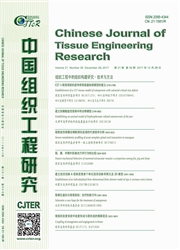

 中文摘要:
中文摘要:
全球终末期肝病、肝衰竭的发病率和死亡率逐年升高,且目前肝移植是唯一疗效确切的治疗选择,但是,肝移植的使用受到肝源供体严重不足,长期存活率低,医疗费用昂贵等缺点使得原位肝移植的应用受限,绝大多数患者无法受益。为了克服肝脏器官短缺,干细胞替代治疗策略逐渐成为另一个肝病治疗的重要选择,干细胞治疗,特别是间充质干细胞(MSC)提供了一个新的肝病治疗选择。MSC是一群贴壁生长的成纤维细胞样细胞,由于MSC能够分化为多种类型的细胞,能够产生多种的细胞因子和生长因子,具有造血支持和免疫调节和抗炎功能,MSC被认为在再生医学领域具有重大的科学和实用价值。另外,由于MSC应用于治疗实验性肝损伤能明显提高动物存活率,明显改善肝功能。此外,一些临床前研究和临床研究也表明MSC对肝损伤性疾病具有显著地疗效。因此MSC在损伤性和退行性肝脏疾病的治疗具有广阔的应用前景。本文综述了MSC在肝损伤疾病治疗应用的进展,并对MSC在肝病治疗中的应用前景进行了展望。
 英文摘要:
英文摘要:
Morbidity and mortality from end-stage liver disease is increasing rapidly in the world. Currently orthotopic liver transplantation is the only definitive therapeutic option. However, due to liver donor shortage, low long term graft survival rate and high medical cost, most patients still can not benefit from liver transplantation. To overcome liver shortage, stem cell replacement strategy is a potential alternative in management of liver diseases. Stem cells, especially mesenchymal stem cells (MSC) therapy provide a promising treatment choice for liver diseases. MSC represent a heterogenous population of fibroblast-like cells. And MSC are capable of multi-differentiation, soluble growth factors and cytokines production. They can support hematopoiesis and have immunomodulatory and anti-inflammatory function. In addition, MSC can significantly improve liver function and animal survival after infusion to animals with experimental liver injury. Some preclinical studies and clinical trials also showed that MSC are safe, feasible and beneficial for patients suffer from liver diseases. Therefore, MSC show the exciting clinical application prospects in the treatment of chronic liver disease. Here, we review MSC treatment application and their mechanisms in liver diseases.
 同期刊论文项目
同期刊论文项目
 同项目期刊论文
同项目期刊论文
 期刊信息
期刊信息
